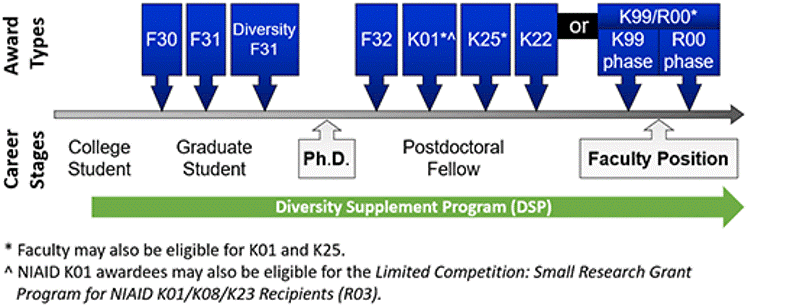Research Education Workshops and Seminars

NIH Grant Mechanisms by Career Stage - PhD Track
Graduate students pursuing biomedical Ph.D. degrees can apply for an F30 (for dual degree pursuits, such as M.D./Ph.D. training) or F31 (including the Diversity F31, if eligible). After your Ph.D., as a postdoctoral fellow apply for an F32, K01, or K25. NIAID K01 awardees may be eligible for the Limited Competition: Small Research Grant Program for NIAID K01/K08/K23 Recipients (R03) to help start a research career. To ease your transition into a faculty position apply as a postdoctoral fellow to either the K22 or K99/R00. source: https://www.niaid.nih.gov/grants-contracts/choose-award-career-stage
Seminars and Workshops Offered to Support Research Education
Seminars and workshops are offered each academic semester to support grantsmanship, scientific writing, oral speaking and general research education. Please visit this webpage to view upcoming events, register for the workshops/seminars and view resources relevant to the topics.
-
Stay tuned Spring 2024 for additional workshop opportunities
Grants and Scientific Writing Workshops
- NIH F31 Predoctoral Award
- NIH F32 Postdoctoral Award
- NIH K99/R00 Pathway to Independence Award
- NIH K01 Research Scientist Development Award
Typically, students apply for the NIH F31 NRSA in the 3rd or 4th year of their Ph.D. Notably, you can apply earlier in your 1st or 2nd year, and are eligible all the way through your 5th year. Funding requests allow support of stipend, tuition and fees and you can request funding for 2-3 years.
NIH NRSA F32 fellowships provide up to three years of support for promising postdoctoral researchers who have the potential to become productive, independent investigators within the broad scope of biomedical, behavioral, or clinical research. Before the postdoctoral fellowship award can be activated, the individual must have received a Ph.D. or equivalent research degree
The K99/R00 program is designed to facilitate a timely transition from a mentored postdoctoral research position to a stable independent research position with independent NIH or other research support at an earlier stage than is currently the norm. The mentored K99 phase of the award takes place at the University of Minnesota and lasts 1-2 years. Extramural research institutions are eligible sites for the independent R00 phase of the award which lasts up to 3 years.
Key highlights of the award are that it both shortens the time that researchers spend as postdoctoral fellows and facilitates the transition to independent NIH Research Grant Program (R01) funding. Funding amounts cap at $90,000 per year for K99 portion and $250K per year for the R00 phase.
The purpose of the K01 award is to provide an intensive, supervised, research and career development experience for nonclinical, doctoral researchers as they transition to independent research careers. Award amounts are for 3 to 5 years of non-renewable support for transition period between postdoctoral training and an independent research career, all in support of transitioning PhD (or equivalently trained) junior faculty to independence.
Oral Speaking and Preliminary Examination Workshops
The Three Minute Thesis competition celebrates the exciting research conducted by Doctor of Philosophy students. Developed by The University of Queensland, 3MT cultivates students’ academic, presentation, and research communication skills. The competition supports their capacity to effectively explain their research in three minutes, in a language appropriate to a non-specialist audience.